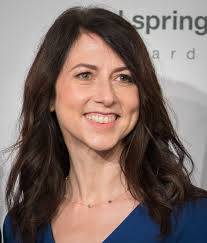MacKenzie Scott is an American novelist, philanthropist, and former wife of Amazon founder Jeff Bezos. She is renowned not only for her significant contributions to literature but also for her transformative philanthropic efforts aimed at addressing social and economic inequalities.
Early Life and Education
• Full Name: MacKenzie Scott Tuttle
• Birthdate: April 7, 1970
• Birthplace: San Francisco, California, USA
MacKenzie Scott was raised in a family that valued education and intellectual curiosity. She attended Hotchkiss School in Connecticut and went on to earn a degree in English from Princeton University in 1992, where she graduated summa cum laude. While at Princeton, she studied under the renowned writer Toni Morrison, who played a significant role in shaping her literary voice.
Career in Writing
After completing her education, MacKenzie Scott pursued a career in writing. She published her first novel, “The Testing of Luther Albright,†in 2005, which received critical acclaim and was nominated for the American Book Award. Scott has authored several other novels, including “Traps†and “The Arrangement.†Her literary work often explores themes of identity, relationships, and personal struggle, reflecting her profound insights into human nature.
Marriage to Jeff Bezos
MacKenzie Scott met Jeff Bezos in the early 1990s while working at a hedge fund in New York City. They married in 1993 and later moved to Seattle, where Bezos founded Amazon. Scott played a pivotal role in Amazon’s early days, supporting the company’s growth while managing various aspects of their family life.
In 2019, after 25 years of marriage, Scott and Bezos announced their divorce. As part of the settlement, she received 25% of their Amazon stock, making her one of the wealthiest women in the world.
Philanthropy
Following her divorce, MacKenzie Scott emerged as a notable philanthropist, committing a significant portion of her wealth to charitable causes. She has pledged to give away the majority of her fortune, focusing on organizations that address social inequalities and promote systemic change. Key aspects of her philanthropic approach include:
• No Strings Attached: Scott has adopted a unique giving strategy, providing unrestricted funds to organizations without imposing conditions or limitations. This approach empowers recipients to allocate resources as they see fit, fostering greater impact.
• Focus on Underrepresented Communities: She has prioritized funding for organizations led by people of color, women, and marginalized communities, recognizing the importance of supporting diverse voices in philanthropy.
• Large Donations: In 2020, Scott made headlines when she announced a $4.2 billion donation to 384 organizations across various sectors, including education, racial justice, public health, and economic mobility. This unprecedented giving spree has continued in subsequent years, with Scott committing billions more to various causes.
Personal Life
MacKenzie Scott is known for her private nature, often shying away from the spotlight despite her wealth and philanthropic endeavors. In 2021, she married Dan Jewett, a science teacher, and announced her intention to continue her philanthropic work with him by her side.
Legacy
MacKenzie Scott’s legacy is being shaped not only by her contributions to literature but also by her impactful philanthropic efforts. She has become a leading figure in the movement for effective altruism, demonstrating that substantial wealth can be used to address pressing social issues.
Through her innovative giving strategies and commitment to equity, Scott is influencing how philanthropy is approached in the modern era. Her focus on unrestricted funding and support for diverse organizations has set a precedent that challenges traditional philanthropic models, encouraging a more inclusive and impactful approach to charitable giving.
As she continues to pledge her wealth to meaningful causes, MacKenzie Scott’s influence in both literature and philanthropy is expected to grow, inspiring others to consider the broader implications of wealth and responsibility in society.



No comments yet
Be the first to share your thoughts!